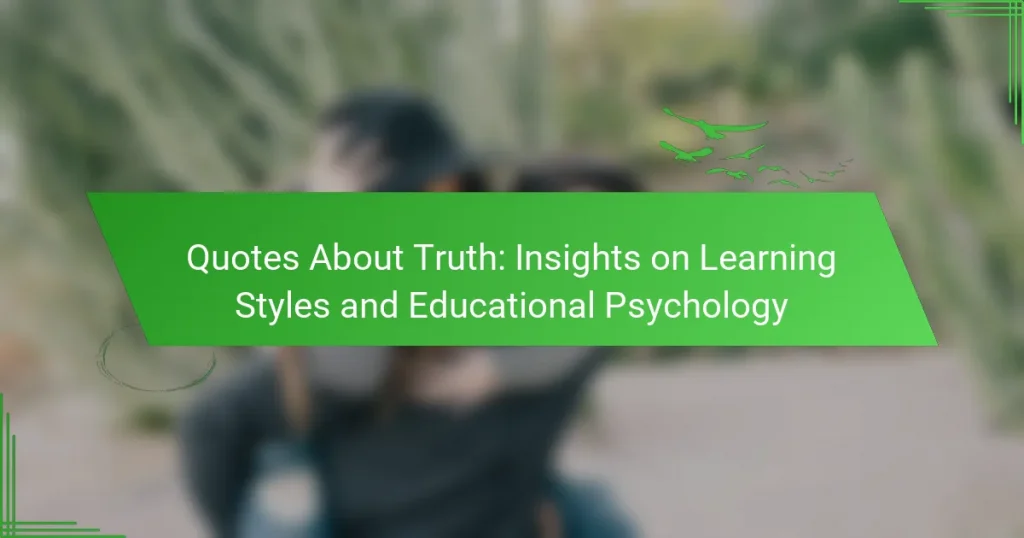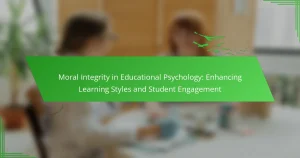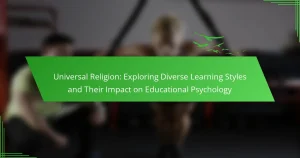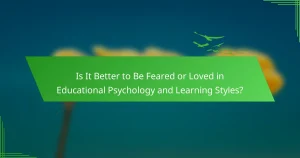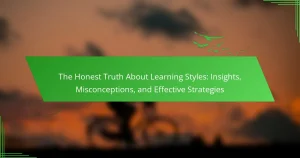Understanding truth in educational psychology enhances engagement and retention in learning. This article explores the importance of authenticity, critical thinking, and personal growth in education. It highlights unique insights on diverse learning styles and best practices for fostering inclusive environments. By emphasizing truth, educators can promote deeper understanding and effective communication among students.
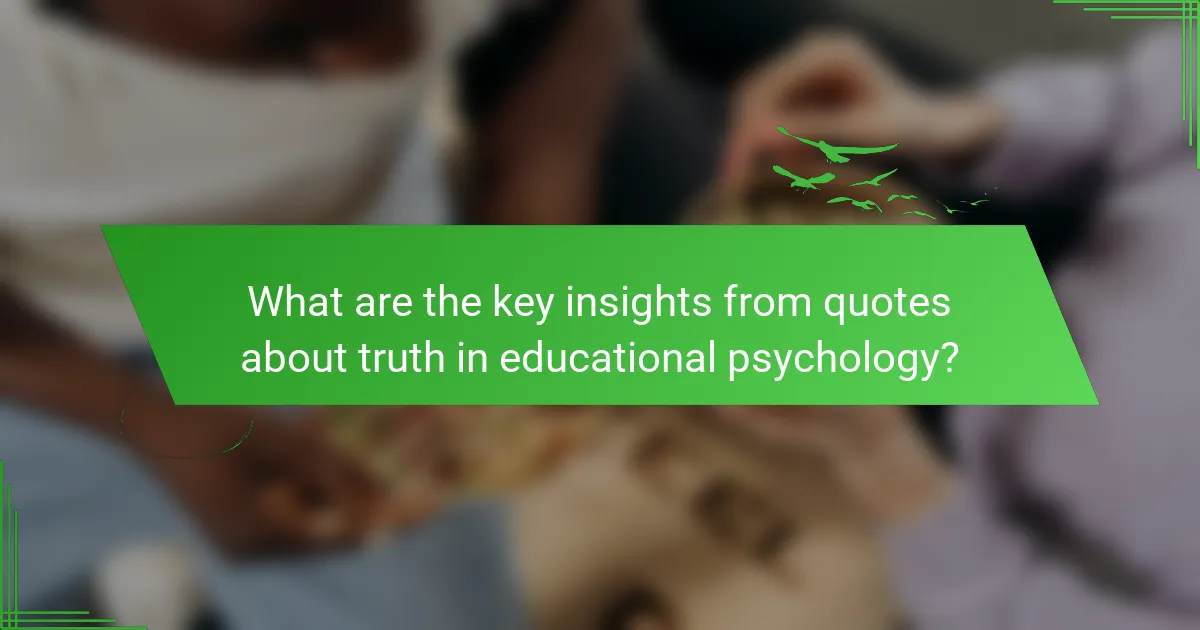
What are the key insights from quotes about truth in educational psychology?
Quotes about truth in educational psychology emphasize the importance of authenticity in learning. They highlight that understanding personal truths enhances engagement and retention. For instance, a quote by Carl Rogers suggests that when students connect with their own experiences, they learn more effectively. This aligns with the unique attribute of personalized learning styles, which can significantly impact educational outcomes. Additionally, insights from various educators stress that fostering an environment of honesty encourages critical thinking and self-reflection, essential components of effective learning. These perspectives underline the root attribute of truth as a catalyst for deeper understanding in educational contexts.
How do different learning styles interpret truth?
Different learning styles interpret truth through distinct lenses, influencing how individuals perceive and process information. Visual learners often seek concrete representations, while auditory learners prefer verbal explanations. Kinesthetic learners engage through hands-on experiences, shaping their understanding of truth through physical interaction. Each style fosters unique insights, highlighting the multifaceted nature of truth in educational psychology.
What are the main learning styles identified in educational psychology?
The main learning styles identified in educational psychology are visual, auditory, and kinesthetic. Visual learners prefer diagrams and charts, auditory learners benefit from discussions and lectures, while kinesthetic learners engage through hands-on activities. Each style influences how individuals absorb and retain information effectively.
How do quotes reflect the experiences of diverse learners?
Quotes reflect the experiences of diverse learners by highlighting varied perspectives on learning and understanding. They capture the essence of individual journeys, showcasing how different backgrounds influence educational experiences. For instance, quotes from educators emphasize the importance of inclusivity, while those from students reveal personal challenges and triumphs in learning. These insights foster empathy and recognition of diverse learning styles, ultimately enriching the educational landscape. Such reflections can motivate educators to adapt their teaching strategies, ensuring all learners feel valued and understood.
What role does truth play in shaping educational practices?
Truth plays a crucial role in shaping educational practices by fostering an environment of integrity and authenticity. It encourages open dialogue, critical thinking, and trust between educators and students. When truth is prioritized, it enhances the learning experience and promotes a culture of honesty and accountability. Research indicates that educational environments grounded in truth lead to better engagement and retention of knowledge. Thus, integrating truth into educational practices not only enriches learning but also prepares students for ethical decision-making in their futures.
How can educators apply insights from quotes to enhance learning?
Educators can enhance learning by integrating insights from quotes about truth into their teaching strategies. These quotes can illuminate various learning styles, fostering a deeper understanding of educational psychology.
Quotes often encapsulate complex ideas succinctly, making them effective tools for engaging students. For instance, a quote emphasizing the importance of honesty in learning can motivate students to embrace authenticity in their educational journey. This aligns with the unique attribute of fostering a supportive classroom environment.
Additionally, educators can use quotes to stimulate discussions, encouraging students to reflect on their own learning experiences. This practice not only promotes critical thinking but also helps in recognizing diverse perspectives, a root attribute essential for collaborative learning.
Incorporating quotes into lesson plans can also serve as a rare attribute that enhances retention. Students are more likely to remember concepts linked to impactful statements, making learning more memorable and effective.
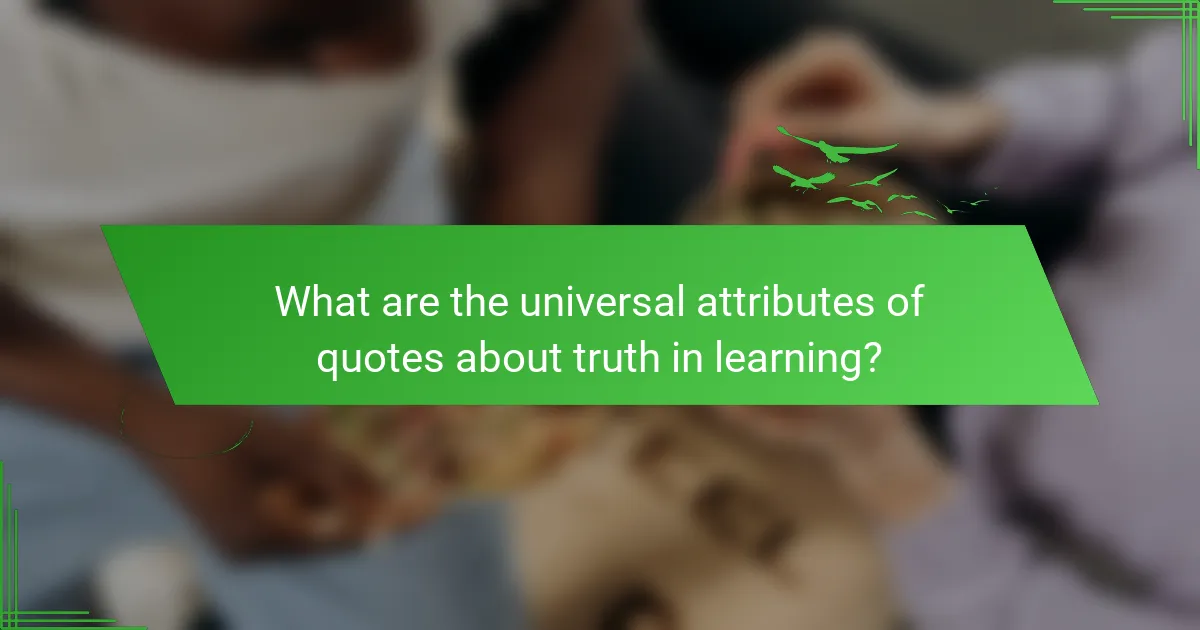
What are the universal attributes of quotes about truth in learning?
Quotes about truth in learning emphasize authenticity, critical thinking, and personal growth. Universal attributes include clarity, relevance, inspiration, and reflection. Clarity ensures messages are easily understood, while relevance connects the quotes to diverse learning styles. Inspiration motivates learners to pursue knowledge, and reflection encourages deeper understanding. These attributes align with educational psychology principles, fostering an environment conducive to effective learning.
How do these quotes promote critical thinking among students?
Quotes about truth foster critical thinking by encouraging students to question assumptions and explore diverse perspectives. They serve as catalysts for discussion, prompting deeper analysis of ideas and concepts. For instance, a quote may challenge a widely accepted belief, leading students to evaluate evidence and articulate their viewpoints. This process enhances cognitive skills, promoting independent thought and reflective learning. Engaging with quotes also cultivates a growth mindset, as students learn to appreciate the complexity of truth and the importance of ongoing inquiry.
What common themes emerge from these quotes?
Common themes from quotes about truth in educational psychology emphasize the importance of honesty, self-reflection, and adaptability in learning. These insights highlight that understanding one’s learning style can lead to more effective educational outcomes. Additionally, many quotes suggest that truth fosters a deeper connection between educators and students, enhancing the overall learning experience. Embracing truth in education encourages a culture of open communication and growth, ultimately benefiting both learners and educators.

What unique perspectives do quotes about truth offer?
Quotes about truth provide unique perspectives by emphasizing integrity, self-awareness, and the pursuit of knowledge. They encourage critical thinking and reflection on personal beliefs, which are essential in educational psychology. For example, a quote may highlight the value of honesty in learning environments, fostering trust between educators and students. This reinforces the idea that truth is foundational for effective communication and understanding in education. Such insights can enhance various learning styles by promoting an atmosphere where questioning and exploration are welcomed.
How do cultural contexts influence the interpretation of truth?
Cultural contexts significantly shape how truth is interpreted in educational settings. Different cultures prioritize various values and beliefs, influencing learning styles and perceptions of knowledge. For instance, collectivist cultures may emphasize communal truth, while individualistic cultures may focus on personal experience. This divergence affects educational psychology, as students from diverse backgrounds approach truth and learning differently. Understanding these cultural nuances can enhance teaching methods and foster more effective learning environments.
What unique quotes challenge conventional learning theories?
Quotes that challenge conventional learning theories often emphasize the importance of individual experience and critical thinking. For instance, Albert Einstein stated, “The only source of knowledge is experience.” This perspective aligns with constructivist theories, highlighting the role of personal engagement in learning. Another thought-provoking quote by John Dewey asserts, “If we teach today’s students as we taught yesterday’s, we rob them of tomorrow.” This challenges traditional methods, advocating for adaptive teaching strategies. These insights encourage educators to rethink rigid learning paradigms and embrace more dynamic approaches.

What are the rare insights found in quotes about truth?
Quotes about truth often reveal rare insights into learning styles and educational psychology. They emphasize the importance of authenticity in education, suggesting that genuine understanding fosters deeper learning. One rare insight is the assertion that truth can be subjective, impacting how students perceive and engage with information. This perspective encourages educators to consider diverse viewpoints, enhancing critical thinking. Additionally, quotes highlight the transformative power of truth in personal growth, suggesting that acknowledging one’s own biases can lead to more effective learning strategies. These insights collectively underscore the complex relationship between truth, learning, and educational success.
What uncommon quotes provide unexpected wisdom on learning styles?
Unexpected wisdom on learning styles can be found in uncommon quotes. For instance, Albert Einstein stated, “I never teach my pupils. I only attempt to provide the conditions in which they can learn.” This highlights the importance of creating an environment that caters to diverse learning styles. Another insightful quote from Maya Angelou is, “I did then what I knew how to do. Now that I know better, I do better.” This reflects the evolving nature of learning and adapting to individual styles. Additionally, Carl Jung noted, “The greatest tragedy of the family is the unlived lives of the parents.” This suggests that understanding one’s learning style can unlock potential not only for individuals but also for future generations. These quotes collectively emphasize the need for personalized approaches in educational psychology.
How do these rare insights impact educational psychology?
Rare insights significantly enhance educational psychology by revealing diverse learning styles. Understanding these styles allows educators to tailor their approaches, fostering effective learning environments. For instance, insights into kinesthetic learners highlight the need for hands-on activities, while auditory learners benefit from discussions and lectures. This personalized approach increases student engagement and retention, ultimately improving educational outcomes.
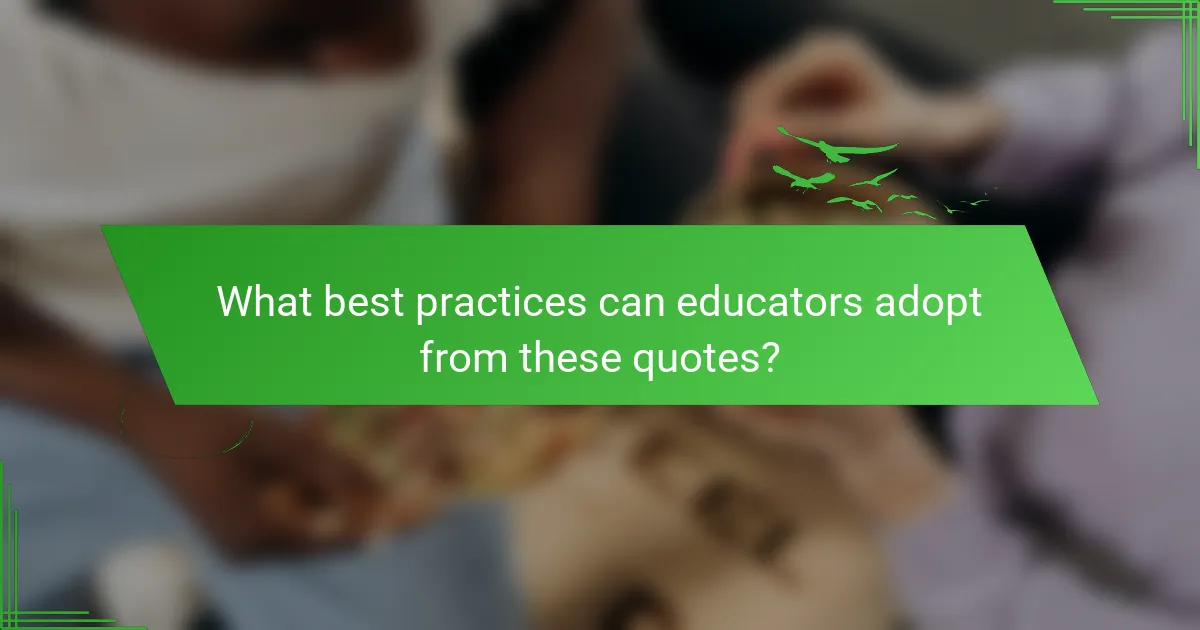
What best practices can educators adopt from these quotes?
Educators can adopt several best practices from quotes about truth that emphasize learning styles and educational psychology. These practices include fostering open dialogue to encourage critical thinking, recognizing diverse learning preferences, and promoting a growth mindset among students. By integrating these principles, educators can create an inclusive environment that values truth and encourages deeper understanding. Engaging students with varied teaching methods enhances retention and application of knowledge, ultimately leading to more effective learning outcomes.
How can educators effectively integrate quotes into their teaching strategies?
Educators can effectively integrate quotes into their teaching strategies by using them to illustrate concepts and provoke critical thinking. Quotes about truth can enhance discussions on learning styles and educational psychology. They serve as relatable references that resonate with students’ experiences. For example, using quotes from renowned educators or psychologists can reinforce the importance of diverse learning approaches. Incorporating quotes into lesson plans can stimulate engagement and foster deeper understanding among students.
What common mistakes should educators avoid when discussing truth in learning?
Educators should avoid presenting truth as absolute, neglecting diverse perspectives, and failing to engage students in critical thinking. These mistakes can hinder understanding and limit the exploration of complex topics. Emphasizing multiple viewpoints encourages deeper learning and respects individual learning styles. Encouraging open dialogue fosters an environment where students feel safe to express their thoughts, ultimately enriching the educational experience.
What expert insights can enhance understanding of truth in learning styles?
Expert insights underscore the complexity of learning styles and their impact on educational psychology. Research indicates that individual learning preferences can significantly shape engagement and retention. For instance, Howard Gardner’s theory of multiple intelligences emphasizes diverse cognitive strengths, suggesting tailored approaches enhance effectiveness. Moreover, understanding the interplay between intrinsic motivation and learning styles can foster deeper comprehension. As educational models evolve, integrating these insights remains crucial for optimizing teaching strategies and promoting holistic development.
